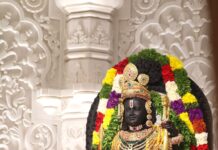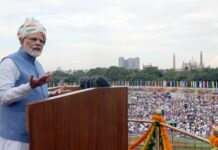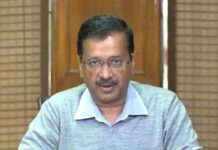INDIA’S COVID-19 vaccination drive has achieved a historic milestone of administering 1 billion vaccine doses. Around 75% of the eligible population (18+) has been given the first dose, while around 30% has been given both doses.
India has achieved this mark of 1 billion vaccine doses in less than 40 weeks. This milestone exemplifies India’s prowess in various elements in the vaccination journey – development of new vaccines, production of vaccines, deployment, and technology.
India’s COVID-19 vaccination drive was launched on January 16, but preparations had begun way back in April 2020 with the establishment of the National Task Force for Focused Research on Corona Vaccine. Indeed, a hallmark of India’s vaccination drive has been the high-level oversight and coordination, with Indian Prime Minister Narendra Modi keeping a close watch on the situation, intervening whenever necessary.
“Today is a historic day as India has crossed the 100 crore [1 billion] vaccine dose mark. To counter the largest pandemic in 100 years, the country now has a strong protective shield of 100 crore vaccine doses. This achievement belongs to India and its citizens,” the Prime Minister said on Thursday in New Delhi.
Modi visited the Ram Manohar Lohia Hospital to express his gratitude to doctors, nurses and others who helped India cross the 1-billion mark COVID-19 vaccination mark.
In a tweet, Modi said, “India scripts history. We are witnessing the triumph of Indian science, enterprise and collective spirit of 130 crore [1.3 billion] Indians.
“Congrats India on crossing 100 crore vaccinations. Gratitude to our doctors, nurses and all those who worked to achieve this feat. #VaccineCentury.”
Modi visited the vaccination centre at the hospital and interacted with the health workers. He also gave a thumbs up to the health workers at the hospital.
Today, India is the only country that has developed multiple vaccines across multiple platforms (Bharat Biotech’s COVAXIN uses an inactivated virus platform, Zycov-D is a DNA vaccine, Covishield a viral vector vaccine, Gennova is in the running for being India’s first mRNA vaccine).
The National Covid Vaccination Program initially targeted the healthcare and frontline workers as well as senior citizens, due to their higher risk perception. Subsequently, the Program was rolled out to include people above 45 years of age and with co-morbidities and later, all citizens above 45 years were included. In the ongoing phase, all adults above 18 years have been included and vaccination is being provided for free at public vaccination facilities. This implies about 940 million people have to be vaccinated with two doses each.
On the approval of Drugs Controller General of India (DCGI), three vaccines have been utilized in the Programme (COVISHIELD developed by Serum Institute of India in collaboration with Astra Zeneca of the United Kingdom, COVAXIN of Bharat Biotech International Limited and Sputnik V of Russia). Nearly all of the 1 billion doses administered have been Made-in-India ones, except for a miniscule proportion of Sputnik V (approximately 0.4 million doses).
More than 95% of vaccine doses have been delivered by India’s public health system, a testimony to its reach and robustness, it is pointed out. The sheer expanse of the vaccination drive can be gauged from the fact that there are 313,000 Covid Vaccination Centres across the country, of which 74% are at rural locations and account for 65% of the total coverage till now. Vaccination teams of 740,000 persons, including more than 264,000 vaccinators, were trained for the task. Private healthcare outlets have also been included in the implementation of the vaccination drive.
A critical contribution to India’s successful vaccination journey has been its experience with the Universal Immunisation Programme (UIP). The cold chain system of UIP was leveraged and upscaled. Vaccines were stored at about 29,000 cold storage points and delivered across the country in more than 700 temperature-controlled vehicles.
The cold chain supply lines are being managed using Electronic Vaccine Intelligence Network (eVIN). eVIN is an indigenously developed technology that digitizes vaccine stocks and monitors the temperature of the cold chain through a smartphone application.
India also developed a unique digital platform of CoWIN. The digital platform has made it possible to register beneficiaries, schedule their vaccination, generate QR Code based vaccine certificates and capture their vaccination history. In addition, it has also kept track of the entire implementation process including daily coverage and vaccine requirement across various Indian states.
The 1-billion landmark celebrates the indomitable spirit of India’s frontline health workers –the nurses, the Auxiliary Nurse Midwives and the thousands of vaccinators, who overcame challenges of terrain and weather to reach the remotest areas ensuring that no one is left behind. Vaccine delivery by drones has also been recently piloted in the North-East Region of the country. Special focus has been given on outreach to pregnant and lactating women, the destitute, vagabonds and other vulnerable groups. In addition, the program now includes Workplace COVID Vaccination Centers, Near to Home Vaccination and Mobile Vaccination Units for easier accessibility. Prioritized vaccination of school teachers was also undertaken to ensure safe education for children.
By the end of 2021, India is looking at an increased monthly production of COVID-19 vaccines, a larger basket of vaccine options and a larger proportion of its population fully vaccinated. This would translate to a larger potential to share vaccines with the world, contributing toward realization of what Modi plugs as “One Earth, One Health”.














